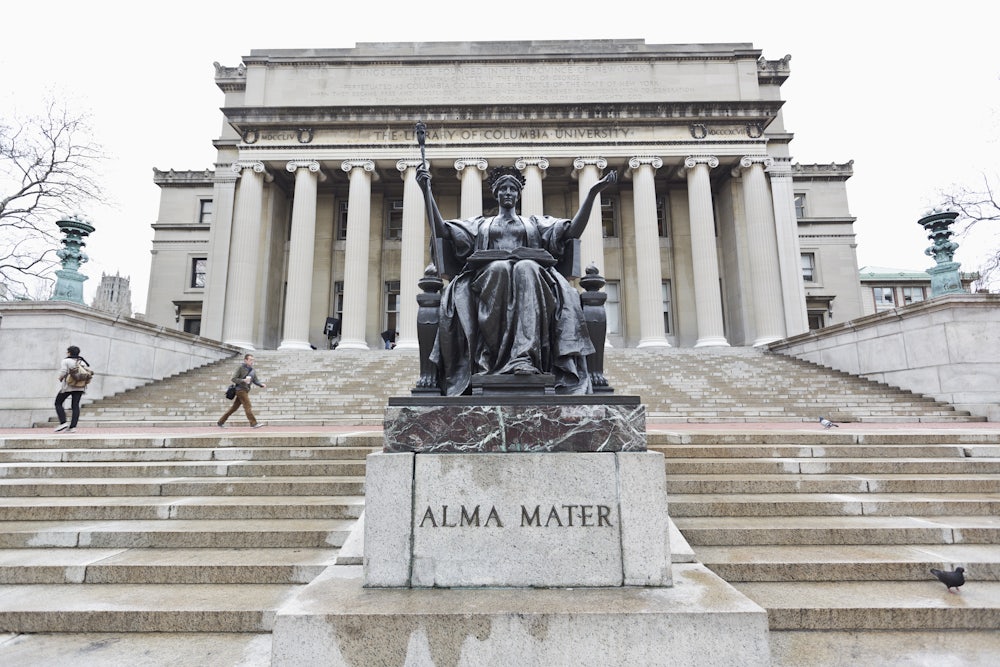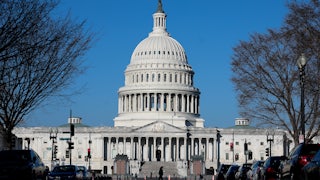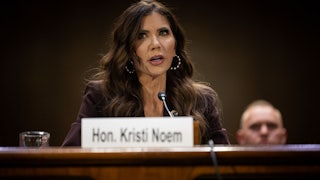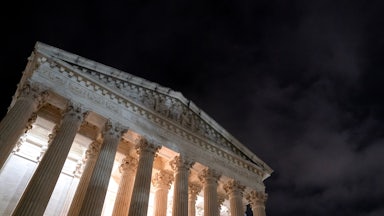On the morning after Columbia University’s interim president resigned last week, I turned by lifelong habit to The New York Times for my first read about a major news event. Much of the article repeated details that I already knew as a longtime faculty member at Columbia’s journalism school: that Katrina Armstrong had been under withering criticism both within and outside the school for capitulating to the Trump administration’s demands in areas ranging from campus policing to admissions practices to academic oversight of Middle Eastern studies. I had even made my own humble contribution to the corpus of denunciations.
In the last few paragraphs of the Times article, though, I paid special interest to a particular paraphrase and quotation. They came from Brent R. Stockwell, department chair of biological studies. Stockwell said that Armstrong actually had “quite a lot of support” for her submission to the Trump edict, which had been accompanied by a cutoff of $400 million in federal aid to Columbia, much of it for medical and scientific research. Casting surrender in virtuous terms, Stockwell declared that professors like him “aren’t willing to give up on the dream that Columbia can better the world and the lives of Americans through research. That is what we are trying to achieve, and that requires federal funds.”
My perusal of the daily outrages against democracy next led me to an article about the coerced resignation of Dr. Peter Marks, the leading vaccine official in the Food and Drug Administration. In leaving, Marks decried Robert F. Kennedy Jr., Trump’s chosen flunky as secretary of health and human services, for insisting on “subservient confirmation of his misinformation and lies” about the purported dangers of provably safe vaccines.
To me, there was a direct connection between the two articles, and I don’t mean simply because both dealt with aspects of MAGA’s authoritarian regime. Marks’s cri de coeur laid bare the utter naïveté of people like Stockwell and Armstrong and Columbia’s Board of Trustees, who evidently believe that they can preserve world-class medical and scientific research by selling out other portions of the university. Why should cures for diseases or discoveries of lifesaving drugs, after all, be sacrificed for the liberal arts’ academic freedom and the free speech rights of pro-Palestinian students?
It seems entirely likely to me that the Trump administration deliberately aimed for a divide-and-conquer strategy, treating the medical and scientific segment of Columbia as the terrified dog with a gun to its head after the famous National Lampoon cover. Armstrong herself, not coincidentally, had been the CEO of Columbia’s Irving Medical Center before taking on the interim presidency, and now she is returning to that position. Nor does it strike me as irrelevant that the medical center and medical school are situated several miles uptown from Columbia’s main campus in Morningside Heights, creating a psychic as well as physical distance from us pointy-headed intellectuals along College Walk.
I am not insensitive at all to the argument that Stockwell made about the vital importance of Columbia’s medical and scientific research. The university’s former provost, Jonathan Cole, made a passionate and principled case for what American society gains from research universities, in a recent essay. The difference is that Cole saw those concrete benefits as a basis for defending Columbia specifically and higher education more broadly from the Mafia-style strong-arming of the Trump gang.
Perhaps people like Stockwell and Armstrong and Columbia’s trustees, accomplished as they are, have never dealt with a protection racket or a loan shark. But surely some of them must have seen at least one or two of the classic American films about mobsters. The lesson of lines like Nice store you got there, shame something should happen to it is that giving in never buys you enduring calm. It just invites the next shakedown.
And that’s where I come back to Dr. Marks, newly driven out of the FDA. One of the affronts to his expertise, and to scientific knowledge itself, was Kennedy’s recommendation of vitamin A, rather than the measles vaccine, to deal with the recent outbreaks in Texas and New Mexico. Another affront was Kennedy’s hiring of a discredited pseudo-scientist to study the supposed link between vaccines and autism—no matter that credible research has established that no such link exists.
If scholars and researchers and administrators in medicine and sciences imagine that they can negotiate a separate peace treaty with the Trump administration, the events at the FDA show how foolish their hope is. What would stop this federal government from making a continued flow of funding contingent on halting research into climate change (a strong suit of Columbia’s, in fact) or undertaking studies to cast doubt on vaccine safety? The Trumpian assault on diversity, equity, and inclusion has already undermined research into racial and other demographic disparities in cancer treatment and outcomes. Scientific method and free inquiry must be bent to MAGA’s orthodoxies and obsessions.
The risk of such intimidation does not end with universities. In the last few weeks, the powerful and wealthy law firms Paul, Weiss and Skadden, Arps have both kowtowed to Trump, lest they be punished under executive orders, as have other firms with attorneys the president deems his enemies. The price of provisional safety was for Paul, Weiss to promise $40 million worth, and Skadden, Arps $100 million worth, of pro bono representation for any client Trump designates. What is going to happen when Trump requires that those firms do the free-of-charge litigation on behalf of election deniers in 2026 or 2028? Or that they help mount a legal defense of a presidential declaration of martial law?
Just as Project 2025 set forth an all-fronts assault on liberal democracy, the response to it must also take a coalition’s form. Perhaps hard experience will teach the quislings the idiocy of their ways. Meanwhile, the university leaders like Michael Roth of Wesleyan and Columbia’s emeritus President Lee Bollinger and unintimidated law firms such as WilmerHale and Jenner & Block should be fusing their separate efforts and assembling the broadest array of allies. The only thing that can possibly defeat divide and conquer is unify and resist.






